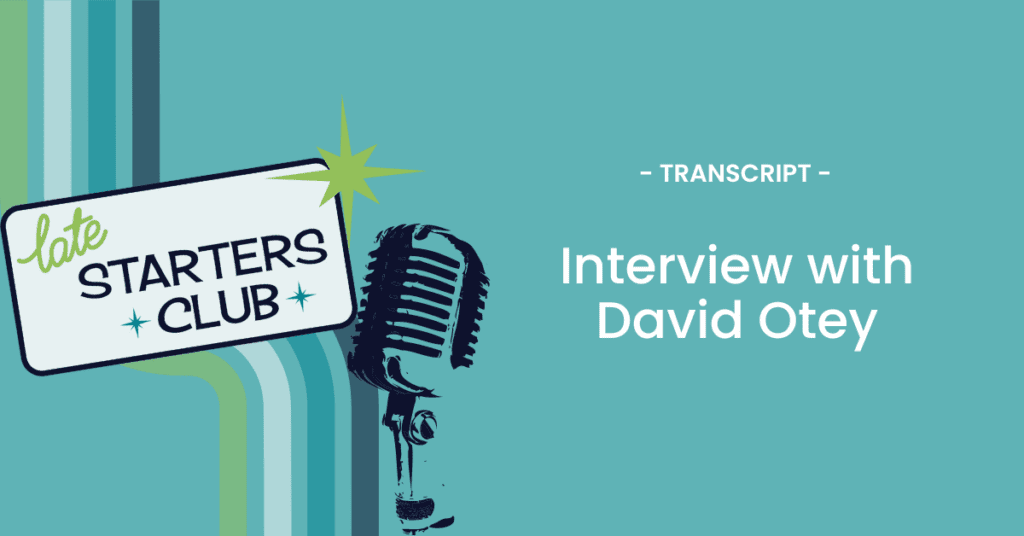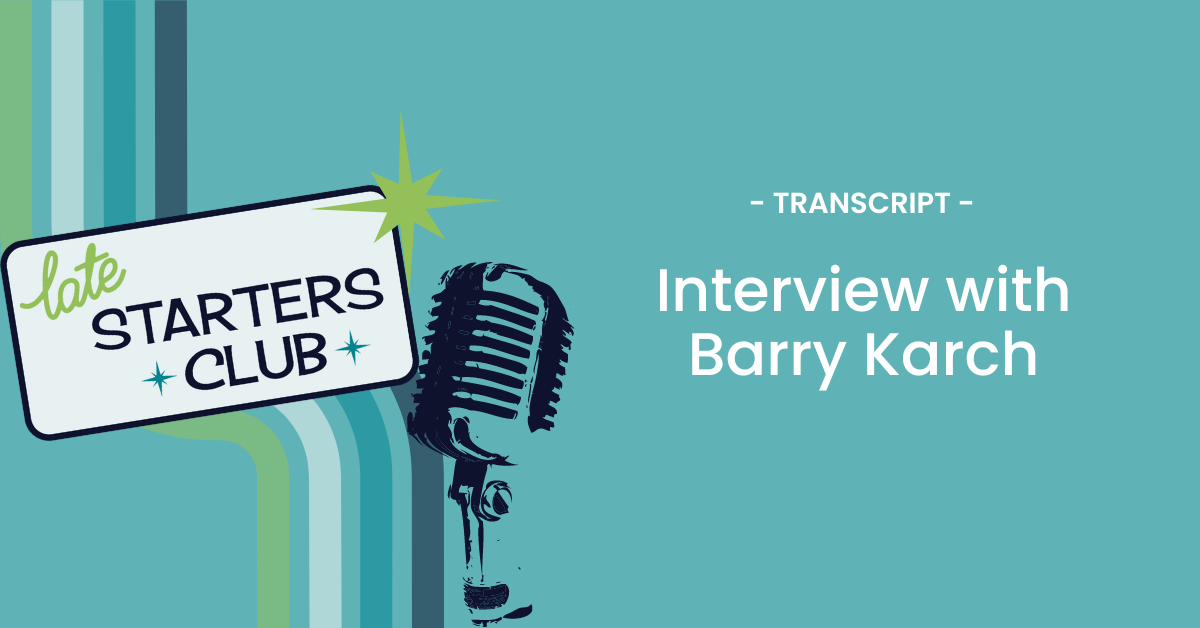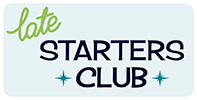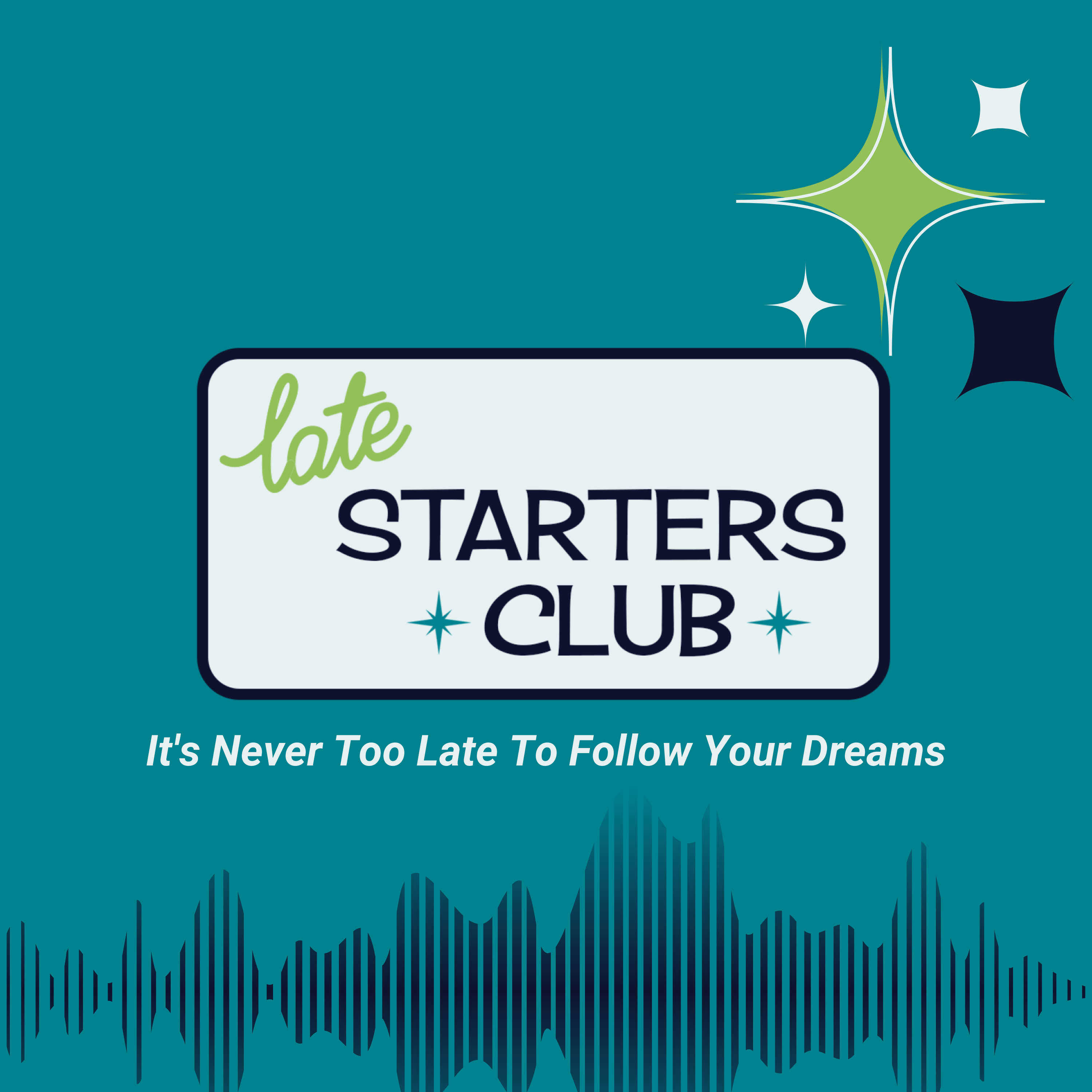Subscribe Apple | Google | Spotify | Stitcher | iHeart Living the Dream Overseas with Christine Gritmon Have you had a lifelong dream to live overseas and haven't made that happen yet? Maybe things have gotten in the way like family, jobs, life. My...
Ep140 Transcript: Interview with David Otey

Andrea Vahl: How do you make the unlikely leap going from engineer to master storyteller, author, and coach? My guest today, David Otey did just that. Listen in as you find out how he made this transition.
Intro: Hello, dreamers. Welcome to the late starters club, giving you the inspiration, mindset, and tools you need to start something midlife and beyond remember, it’s never too late to follow your dreams.
Andrea Vahl: Hello, late starters. It’s your host, Andrea Vahl. And I am joined by the wonderful David Otey, who is a fellow speaker in my, in the national speakers association, Colorado chapter that I’m a part of. And I recently was talking to him and didn’t realize what a wonderful late starter story he had as well.
So had to get him on the podcast. So welcome David.
David Otey: Thank you. It’s a pleasure to be here.
Andrea Vahl: Yeah. So let me just share a little bit about what David does. He is a speaker, coach, author, and he has helped thousands of people add leadership and communication skills to their technical resumes. David is a former engineer with a background in physics and a passion for storytelling.
So David is a, also a former engineer who loves storytelling. Now I, I was excited to have you on here and talk about how you made a big leap in from engineering and to, into what you do now and speaking on stages, you were just speaking, presenting at an event this week. And so it’s really awesome.
So yeah.
David Otey: Thank you. Thank you for that lead in.
Andrea Vahl: Yeah. So why don’t you just give a little background about, what was that leap like from what, you’re working as an engineer and there was something in you that said, Hey, I want to make a complete 180 shift into storytelling, which is really nothing like what I’m doing right now.
How did you make that huge pivot into something new like this?
David Otey: There was an element of storytelling involved even early on because you see, I was in broadcast engineering. I had gone, I was actually a double major as an undergraduate in physics and radio/TV/film.
Yeah. Don’t spend too much time thinking on that. Your head will explode. Yeah. I thought that I was going to go out and make science themed general interest TV shows. Okay. And then I realized I knew nothing. I understood the craft of television and didn’t know the business of it. I realized I knew nothing about how you actually got a TV show in the can and on the air after working for a production studio for a while and making schlocky car commercials. So I did what anyone in their twenties, they’re trying to figure out their life does. I went back to school and pursued a master’s in broadcasting management. And while I was doing that the job that opened up for me drew on my technical background and my electronics from the physics major and everything.
And I started doing the technical side. Of television instead of what we call the creative side. So I’ve, I had a long career of doing the technical work that supported the people who were telling the stories, if you want to think of it that way. And eventually I was working for a company here in the Denver area that specialized in the infrastructure behind the TV broadcasters point to point microwave radio, doesn’t matter what that means, but there was a new technology rolling out that was going to change the way TV news.
And live sporting events were linked back to the studios and I happen to be right in the middle of that technology and was recognized as something of an expert in it. So there was this push to roll out this new technology. There was a lot of pushback from people who said, Whoa, our job skills going to become obsolete overnight.
So a decision was made at a industry summit meeting that I was involved in. To roll out a training project, you would think that might have been the obvious thing to try from the start, but the industry was really notoriously bad about training. So 1 company was selected to provide the training on this new technology across the entire country across the entire U.S. T.V. News industry, and they recruited me as the subject matter expert for the training. That was a feather in my cap. I thought that was going to be cool. The guy who hired me was the training expert. He was the one who knew how to put the program together, train the trainers, create curriculum, all of this.
The problem is shortly after he hired me, he left the company. So I went to his boss who apparently was now my boss. And I said well, what’s your plan for replacing him? And of course the boss said, you. So I very quickly had to pivot then to learn how to be the training expert. And that, that was a bit of an adventure.
I had a lot to learn and made mistakes along the way, but I had a great team around me. And so we put together this training program around this new technology. And I mean, we, we had a great training program or so we thought we had put together the best information available because being a bunch of engineers, we thought the problem we were trying to solve was lack of information.
You want to know how this works, right? About this thing called Coded Orthogonal Frequency Division Multiplexing. And I became the real expert in that. And we rolled this training program out to a pilot audience. And they just, it was not well received. They looked at it like, What? This is what we’ve been waiting for all this time?
So we had to go back to the drawing board. I uh, I, that was uh, in, in Arizona actually, where we did the pilot project and I came back to Denver and I called in a favor with a friend at one of the TV stations and went on a ride along with one of their news photographers. And said, what do you think about this new technology you’re about to get?
And the answer really floored me because he started off with the words, I’m afraid. He said, I’m afraid I’m going to get yelled at or fired when my live shot goes down in the middle of the news, because I don’t know how to use this new technology. And that’s when I realized we were solving the wrong problem.
The problem we needed to solve wasn’t lack of information. The problem we needed to solve was fear. Now imagine this, imagine you walk into a room full of people and you say, I’m here to take away your fear. How well received do you think that would be right?
Andrea Vahl: I’d be like i’m on board i’m on board with that
David Otey: But see the answer was storytelling, yeah, the answer was in storytelling So what we did was we put we scrapped everything we had done.
We started a completely new training program based on a little video montage that told the story Of someone doing their job using the legacy technology. Then another story, another video montage, showing someone doing their job with the new technology. And then we said, what do you notice that’s different?
And by starting with their story and getting them to buy into that story. We had a successful training project. Now, to give you an idea of the scope of this, we, it took 33 months because we couldn’t do the training any faster than this new technology was being deployed and there were bottlenecks along the way.
In that time, we trained more than 10, 000 people in about 900 locations. Wow. And when that was done, I decided, I’m done with television, but this training, this speaking, this idea that I can present information in a way that people become less fearful and more excited about something that I can change their mindset and, change something about their career, maybe their life that just grabbed me and that just grabbed me.
So when that project ended I took a little time and decided, okay, what am I going to do now? And realized. I want to stay in training and professional speaking and I pursued opportunities with some really well known speakers who offered training. Was I’ve been mentored by some world champion speakers and have learned from them and learn how to be a speaking coach and.
As a speaker, it took me a while because, the importance of knowing your niche, right? What’s your thin slice of a topic and your particular slice of an audience, right? The mistake I made for several years was I was running away from my background as a broadcasting engineer.
And then I learned to embrace that and say, I can speak to engineers and other technical professionals about telling their stories. That’s when it clicked for me.
Andrea Vahl: Yeah. Yeah. I love that. And on your, I love the really concise thing you have on your website, which is I work with scientists and engineers to bring their expertise to life so that they can get funding, sell their solutions and expand their reputation.
It’s just such a perfect tagline for what you do in a nutshell. And I love, you know, you’ve got the who in there and then you’ve got the, what they can do, the painting that picture of the, so that they can, I love,
David Otey: I’ve learned from the best. I learned that from Lois Kramer. You know who Lois is, right?
Yes. Yeah. And she is so great at helping speakers understand how to market themselves based on that. That statement that you refine. So she helped me with that.
Andrea Vahl: Yeah. Yeah. I love that. And I love that you are embracing your background because I know, probably with that, you’re probably a pretty unique person out there who’s got the, in depth engineering, technical background, but.
Is able to, approach the speaking and the kind of the storytelling aspect as well, which is what a lot of technical and engineering people have. You got you were saying you’ve got pharmaceutical clients, you’ve got, engineering clients, people who are hiring you to help them with their training, help them with their speaking.
I, I think that’s just amazing ride.
David Otey: I’ve learned to except uh, with, with modesty, but with a certain amount of enthusiasm um, the the praise that people give me for being someone who can connect with audiences like that. I just spent the last 3 days in Saint Louis with a room full of technical experts from a large consultancy mostly electrical engineers, but also there were Biologists, archeologists.
This is a large consultancy in the electrical power industry. And so they’ve got a lot of electrical engineers, but they’ve also got people who can conduct your environmental impact statement, right? Biologists, all kinds of people who can go out in the field. And I just I love connecting with people like that.
It’s not that I need to know all of their jargon, but they understand where I’ve come from. And they think. Oh, if he can do that I can do this too. I can become more effective as a leader, more effective as a presenter, more effective at communicating with these people. I’m leading because now, instead of being a sole contributor, I’m having to get work done through others because now I’m in management.
So that’s 1 of the things I do. It’s not just presentation skills. It’s also other soft skills for leaders. But particularly leaders who are, who have a technical background who have figured out what got me here. Won’t get me there.
Andrea Vahl: Yeah. Yeah. Yeah. Yeah. So I want to dive a little bit into what that transition was like.
Obviously it couldn’t have been an easy, just let’s just open up shop and, start things rolling. You’re In the midpoint of your career here, you’ve, built, you’ve got, you’ve had a job, and now you’re looking to go out on your own, start a business. What was that transition like?
And how did you get through that without I was going to say without being afraid, but of course,
David Otey: I got through it with difficulty.
Andrea Vahl: No, but what was that leap like?
David Otey: What was that leap like? It was it was like realizing that what I had been doing up to that point. Was not moving me in the direction where I really wanted to go, because I realized I had never fully self identified as an engineer, go back to that double major.
I had physics and radio TV film. I’ve always been fascinated with how the world works. And with the stories we tell about how the world works. So it seemed to be a direction that I was ready to move in. And I think one of the most important things I learned that helped me through that transition is the value of bringing with me every single experience I’d had.
Along the way, I had I, I picked up a hobby. In my 40s of doing community theater, and I look back on it now, and I realized that, taking tap lessons for the 1st time at 42 has not necessarily been a great career move,
but I can also say that all the time I’ve spent on stage delivering lines written by. A writer, an author, a playwright and trying to make it sound as if my character has just thought of them in the moment, there’s acting skills that lend themselves to speaking and speaking skills that lend themselves to acting and even if here’s one of the most important things I’ve taken away from that experience, I can give the same speech and know that every time I give it to a new audience, it’s going to be a different experience for that audience.
connection. So one of the most important things that helped me through the transition was ultimately realizing, no, I hadn’t been on the wrong track. I had been on a track that allowed me to gain all kinds of experience with all kinds of different people in broadcasting. I worked on I was in the engineering staff of a little TV show you may have heard of called Austin city limits for 11 years.
Meeting known musicians and their staffs and hangers on. And we did public affairs programming. I met public officials in Texas and I, I no longer get tongue tied like that. That’s helped. It was when you think about. Becoming a professional speaker. I had a lot of people encouraging me, for example, in a Toastmasters club, I had people encouraging me to go in the direction of being a professional speaker.
So what I had in mind first was, okay, maybe now that I need to do something new, maybe I could be a professional speaker, but notice the language I’m using there. What I didn’t know was how to. Start a professional speaking business that came later. Yeah,
Andrea Vahl: yeah, that’s a continual life learning process right there.
I think is that it’s always shifting and changing, right? And I love what you said about the fact that even your tap lessons or your, your every experience that we have is pulling us forward to. the person we need to be or the person we’re meant to be. And I think that’s such a lesson that I have learned to embrace as well in this midlifetime is just there are no wrong choices.
There’s no mistakes. There’s nothing that we’ve done. That’s. That’s something bad. It’s really all part of who we are and it’s beautiful. It’s beautiful. This life we’ve gotten to live in the individual journey that we’ve gotten to take. And I think it’s so fun that you can.
Really pull those lessons in and I really would love to see your tap routine.
David Otey: So would I, but it’s not going to happen today. Bit too out of practice. Those shoes are gathering dust in my closet.
Andrea Vahl: Oh, that’s awesome. That’s awesome. So in your, yeah,
David Otey: go ahead. Yeah.
I was just going to say, and you’re in the audience for your program. Presumably, you have a lot of people who have been on a track and are now on a different track. And what I want to say to them is that doesn’t mean you are ever on the wrong track.
You are on a track that got you to where you are. And without that starting point, you wouldn’t be in a position to go off and do something new.
Andrea Vahl: So true. So true. Yeah. And I wanted to talk, you were mentioning before we hit record here about how you and your wife were making big changes in your lives at the same time. And I think that’s really interesting because oftentimes it’s just a really challenging time. It’s messy. It’s hard. There’s like a lot of, at least for me, I’m just speaking from, but I do feel like it’s, it’s just uncertain times. How did you. How did you weather that with both of you in a transition phase?
David Otey: It was challenging. My wife, as long as I had known her had been a special education teacher specializing in low vision, early childhood, meaning that She taught teachers and parents how to deal with a lot of children with multiple handicapping conditions. When you’re talking about kids under the age of three with vision problems, and in this country, you’re usually not talking about little Helen Kellers, who’ve gotten scarlet fever or something and are otherwise developing normally.
You’re talking about kids with Chromosomal abnormalities or birth trauma or in many cases, unknown causes for what they call significant support needs. And Susan just had a gift for communicating with those children and teaching the significant adults around them how to communicate with them. I call it her first ministry and I say that because now she is actually in ministry.
She made the decision while we were living here in Denver to pursue a master’s degree at the Isle of School of Theology. So she has a master divinity degree and is now an ordained. Minister in the United Methodist Church, which was the reason for our last three moves, moving away from Denver to Billings, Montana and Great Falls, Montana, and then back here to Golden five years ago.
My father was a minister. We moved several times when I was growing up. So when she said she was going that direction, I knew what to expect. And that transition for her going into pastoral ministry occurred about the same time we were getting that training program on its feet. And then to further complicate things, as we were starting to get this training program on its feet out of a TV studio in Pittsburgh, and my wife was in her last semester of her MDiv studies at ILEF, both of her parents died within a few weeks of each other.
Oh, my gosh. Um, As a result of some longstanding health issues. So she was. Flying off to Dallas to deal with that. I was flying off to Pittsburgh. My mother, bless her, came up here to Denver and stayed with our children. If you were to look at one of those scales that adds up, what are your stress factors, loss of a parent, change of a job, change of career.
You add them all up. We were off the charts. Yeah, we’re absolutely off the charts.
We wouldn’t have gotten through it without each other. We just celebrated our 36th anniversary earlier this week. And I’m just convinced that somehow or other each of us has been able to be there for the other when we most needed it. And it may well be that steel was hardened in the forge, so to speak of, of my experience with recovery from depression, because before I went down that road with the the training project and everything and ended up leaving broadcasting, I had gone down a very dark road with major clinical depression and our recovery, I say my, I say our recovery, my recovery from that, my whole family Brought out, I think, the depth of a spiritual connection in our relationship that we may not have been aware of up to that time.
And I think that may have been part of what led Susan to pursue a degree in divinity at Ilo School of Theology. So that I think that my experience, while it was part of my professional journey, was also part of her faith journey. So she’s now in ministry. I say I’m a professional speaker, but she’s the one who gets up and gives a new sermon every week.
Andrea Vahl: Yeah, that is true. That is, I think about that all the time with when I’m at, when I’m at church, I’m thinking, wow that’s a big speech every week.
David Otey: I have tremendous respect for her. Yeah. But she’s that’s why she’s always told me, David, I don’t need to go to Toastmasters with you. I don’t need to go to NSA with you. I’m up there speaking every week.
Andrea Vahl: But that’s wonderful. And what a wonderful support and wonderful connection that is. So thanks for sharing that.
And I think that family is such a critical piece of being secure enough and being able enough to. to take a leap because you, it really, you need that support. You need that that emotional and sometimes financial and stability and support when you’re going through big changes like that.
And and I think it’s, I think it’s really interesting that, you did go through that depression phase. Before you made the change and I think that is very common in as we come to grips with what is my life about and what, what am I here for and what and I, not speaking to what you were going through at all, but I’ve seen that.
Through the people I’ve interviewed is that, it’s a, it’s tough because we’re searching for that, that searching for meaning, searching for what brings us joy in this half of life as we understand how important the time we have left is and. I think that’s what makes this time really exciting as well as we, we get to more intentionally choose than we may have done when we were in our twenties and didn’t know as much.
And
David Otey: that’s true. Yeah. If I were to say anything to, if I had the opportunity to say anything to my Twenties self, it would be make bolder choices, the risks are not as great as you thought they were of trying something new and different at that stage in your life.
I think not that they’re. Very many choices. I would go back and change. Because they might’ve resulted in not having the family and the situation I have now, because as we spoke about every, everything you’ve done up to a certain point is what propels you forward. So I’m not saying I have regrets.
I just am aware now that I made a lot of choices at the time that were the safe choice. Yeah. And I wonder if I had taken a little more risk at certain points with my choices. Would I have found something as fulfilling as what I’m doing now, sooner?
Andrea Vahl: Yeah. That is such an interesting point.
And that is actually a point that a lot of my guests have said is that they would tell their younger selves to make, take more risk. I feel like we should. Get on a speaking circuit, talking to 20 some year olds and just say that because it. At the time, maybe it felt risky, the choice we made, but we’re looking back now.
I was like, that wasn’t risky. That was pretty safe. Yeah. Yeah. Yeah. So that is awesome. And I love that. I I love what you said in your when you’re talking about storytelling and that choice you’ve made, you said the most interesting problems are the ones that you solve by connecting people.
David Otey: So yeah. Yeah. There was a time when I thought the most interesting problems are the ones you solve by connecting boxes and wires and doing things, with cool electronic gizmos. And eventually I came to realize, no, the most important, most satisfying problem, and in many cases, the most challenging problems are the ones that have to be solved by connecting people or connecting people and ideas.
And that’s what I try to do now.
Andrea Vahl: Yeah. That’s awesome. I love that. I love that. I, this has been so great, David, and as I always do with all of my guests, I love to hear an inspiring quote or something motivational that keeps you going that that you love. I’m a quote junkie, so I love to just collect them all.
David Otey: I think a quote that has meant a lot to me, Appalled me the first time I heard it. I thought that can’t be right. It’s the quote by Albert Einstein that says imagination is more important than knowledge. And when I first encountered that, I was at a stage in my life where I put a lot of stock in my knowledge.
I thought that the the value I brought to what I was doing was having a lot of answers. And later I came to realize. That often the most valuable person in the room is not the one with all the answers. It’s the one who’s making sure we’re asking the right questions. And so I’ll share a longer version of that quote with you from Albert Einstein, because I really love this quote now.
I’ve come to embrace it. He said, imagination is more important than knowledge, for knowledge is limited to all we know and understand. While imagination embraces the entire world and all there ever will be to know and understand. And I love that because I feel like I’m on a journey of learning to embrace more things, more knowledge of myself, more knowledge of the world, and more knowledge of how my interacting with people in the world can make a difference.
Andrea Vahl: That’s awesome. I don’t, I’ve heard the shorter quote. I haven’t heard the longer quote. So thank you so much for sharing that longer quote because I think it’s beautiful. So thanks. Thank you. Thank you, David. Thank you for joining us. Thank you. Thank you for your inspiration. out there in the world and for inspiring the listeners here as well.
And and just, I’m excited for all that you are doing to grow speakers and storytellers around the world.
David Otey: Thank you, Andrea. It’s been a real pleasure having this conversation with you. All right. Bye everyone.
Outro: Hope that was helpful and make sure you grab the free guide top tools for late starters on the website at late starters club. com and let’s turn dreaming into doing.
Join the conversation.
Let us know what you think about this episode.
Never miss an episode.
Subscribe to the podcast
You may also enjoy…

Ep170 Transcript: Finding New Motivation with Barry Karch
Finding New Motivation with Barry Karch Andrea Vahl: It's never too late to restart something you loved. My guest today, Barry Karch, started training for a marathon after a 20 year hiatus. And we'll also dive into how he climbed the equivalent of Mount Everest...

Ep169 Transcript: Questions to Kick Start 2024
Andrea Vahl: Oh, happy new year. Yeehaw. 2024. All right. I don't know about you, but I love planning out my year and setting goals and really reflecting on how my past year went and being super intentional about what I want the next year to look like. In today's...

Ep168 Transcript: Wrapping up 2023 with Gratitude, Grace, and Goals
Hello, late starters. It's your host, Andrea Vahl And today is Christmas day. And if you do celebrate that Merry Christmas, if you celebrate some other holiday, I wish you all the best and all the joy for that. I just wanted to make a different episode. So today we're...


0 Comments